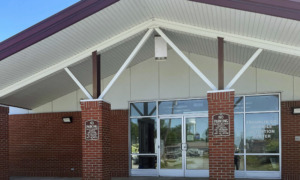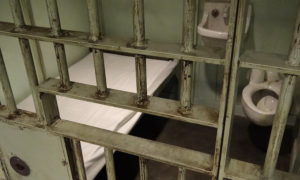Meranda Davis knows her daughter hasn’t always been an angel. Auto theft, assaults, wild tantrums in court left a judge little choice but to send the 15-year-old to Copper Lake School for Girls, one of Wisconsin’s two juvenile detention facilities.
“If you choose to steal cars, you deserve to wind up in a juvenile jail. I know that,” Davis said Monday. “But nobody deserves to be treated the way they treat people in there.”
That treatment, according to a federal lawsuit filed this week, includes indiscriminately dousing entire wings of youth facilities with pepper spray designed to deter bears and locking teens in solitary confinement for up to 23 hours per day. The allegations are the latest against the facilities, which have already attracted the attention of the U.S. Department of Justice and local child care advocates.
“If I locked my son in his room for a day, a week or a month, it would be called child abuse. If I chained him to a table, if I sprayed him with pepper spray it would be called child abuse,” said Jessica Feierman, associate director of the Juvenile Law Center, which filed the lawsuit along with the American Civil Liberties Union of Wisconsin. “When children are entrusted to the state’s care, the standard should be just as high.”
Many of the abuses outlined in the lawsuit have been well chronicled in the state’s media and legislative bodies. But efforts to improve the facilities have been slow or nonexistent, prompting the legal action, said Laurence Dupuis, attorney for the ACLU of Wisconsin, at a press conference today.
The crux of the lawsuit focuses on what lawyers called the state’s excessive use of solitary confinement to punish children for even minor offenses. The practice runs counter to nationwide trends against isolating youth, and ignores recommendations from the American Medical Association and medical studies showing the corrosive and dangerous effects it has on teenagers.
John Paquin, administrator of Wisconsin’s Division of Juvenile Corrections, did not respond to a voice message left on his office phone.
The solitary cells at the Lincoln Hills School for Boys are known as “cottages” in the prison, but Dupuis and the lawsuit describe them as anything but. The 7-foot by 10-foot cells contain only a bed and toilet. No desks, no pencil or pads for schoolwork, not even a chair.

Copper Lake School
Teenagers are sentenced to as long as 30 to 60 days in solitary confinement, even though state rules call for a maximum of four days. As many as 20 percent of the youths at the boys’ and girls’ facilities are locked in solitary at any one time, Dupuis said.
“When we started to visit some of the youths [at the two facilities] in October we were shocked by what we heard and what we actually witnessed ourselves,” Dupuis said. “We witnessed a group of guards at the far end of the hallway holding a youth they had pepper sprayed on the ground, then dragging him limping, blinking because of the pepper spray in his eyes to a shower room not far from where we were sitting.”
The boys are locked to shower cages and are routinely pepper sprayed. There were 200 incidents of pepper spraying in the first 10 months of 2016, according to state records.
“Usually when the ACLU shows up, people start changing their habits and things get a bit better. We saw none of that here,” Dupuis said.
Meranda Davis, whose daughter is incarcerated at the Copper Lakes facility until at least March, described phone calls from her frantic teen.
“She call me crying after getting out of solitary. They send kids for two weeks just for talking back in class,” Davis said. “One time, they were punishing a girl in solitary, so they just fired a whole can of pepper spray into the unit. Everyone was coughing and crying. My daughter was coughing up blood.”
A 2015 Justice Department study found that solitary confinement, also known as restrictive housing, “when applied without regard to basic standards of decency, can cause serious, long-lasting harm.”
The DOJ banned solitary for all juveniles in the federal prison system and vowed to crack down on states that abuse the practice, according to the 2015 report.
The civil rights division began looking at the two Wisconsin facilities in 2015. While the investigations are still ongoing, nobody at today’s press conference is holding out much hope for quick action.
“If I had any reason to believe that action was imminent, we may have held off,” Dupuis said. But the situation he witnessed, and the stories he and his team heard from inmates, made the lawsuit necessary.
“The way we, the state of Wisconsin, are treating these children is not just illegal, not just wrong, it’s immoral. It inflicts terrible damage on the youths, it inflicts terrible damage on the guards and it inflicts terrible damage on our society,” he said.





























